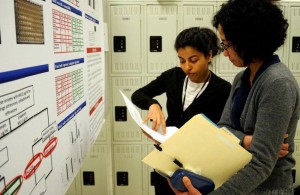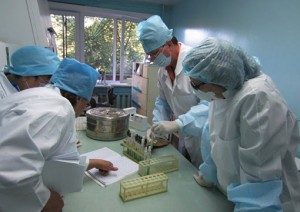Research

Fellow Anita Cheruvanky discusses her poster presentation with Prof. Cirle Warren at ID & Biodefense Research Day.
Division of Infectious Diseases & International Health
RESEARCH
- ID & Biodefense Research Day, 2015
- Promising New Antibiotic for C. difficile Superbug
- Creating Immunity to Deadly E. histolytica
- Gates Foundation Grant for Polio Vaccine Research
- Detecting Causes of Deadly Childhood Diarrhea

Tuberculosis diagnostic lab in Irkutsk, Siberia — a partner study site with UVA Infectious Diseases.
Funding support …
– Gates Foundation grants have been incubators for innovative research in nutrition, vaccinology, human genetics, and immunology — complementing existing NIH support and boosting the impact of work at nine international field sites
– 16 faculty members were principal investigators on NIH grants in FY 2015, including a total of 10 R01 awards and 4 U01s
– 5 junior faculty members had NIH “K” (career development) awards
– The division has been successful in garnering grants for fellows through the NIH Loan Repayment Program, which allow for protected research time
… that leads to new discoveries:
– New antibiotic, amixicile, developed at UVA
– Epidemiology of antibiotic-resistant, gram-negative bacteria
– The role of the microbiome in nutrition
– Pertussis toxins
– Influenza therapy
– Biodefense, including anthrax and tularemia
– Sepsis diagnosis and treatment in low-income settings
– Improved TB diagnosis and therapy
– C. difficile immunotherapy
– Amebic trogocytosis
– Breastfeeding prevention of cryptosporidiosis
Research funding for the Division of Infectious Diseases & International Health — a total of $14.5 million in FY 2015 — comprises about half of all research support for the Department of Medicine, and about one-tenth of all support in the School of Medicine. The division has an active and varied research enterprise that spans parasitology, bacteriology, virology, epidemiology, nutrition, healthcare worker safety and international health, supported by high-quality research, conference and administrative space in the Carter-Harrison Research Building.
Faculty conduct research in areas that address many critical national and international health threats and priorities, including biodefense, the development of vaccines, and diagnostic tools and therapies for a variety of infectious diseases. One of the division’s greatest strengths is its international and global research partnerships; faculty work collaboratively and in partnership with university-based colleagues in Bangladesh, Brazil, Haiti, India, Pakistan, Russia, South Africa, Tanzania and Uganda.
Current areas of research:
– Use of mobile technologies to improve health adherence in HIV populations – Rebecca Dillingham, MD, MHP
– Polio and rotavirus vaccines in the developing world – William A. Petri Jr., MD, PhD; Eric Houpt, MD; Mami Taniuchi, PhD
– Molecular epidemiology of multi-drug resistant Gram negative bacteria – Amy Mathers, MD
– Structure and function of bacterial toxins – Erik Hewlett, MD
– Development of antimicrobial peptides as therapy for respiratory infections including anthrax and carbapenamase-resistance Klebsiella pneumonia –Molly Hughes, MD
– Multidrug-resistant tuberculosis and clinical diagnosis – Scott Heysell, MD, MHP; Eric Houpt, MD; Tania Thomas, MD
– Molecular diagnostics of infectious diseases – Eric Houpt, MD; Jie Liu, PhD; Mami Taniuchi, PhD
– Molecular epidemiology of gastrointestinal parasites, including amebiasis and cryptosporidiosis – Carol Gilchrist, PhD
– Novel anaerobic antimicrobial agent Amixicile – Paul Hoffman, PhD
– Live attenuated vaccines for prevention of tularemia – Barbara Mann, PhD
– Mechanisms of iron uptake in Francisella tularensis – Girija Ramakrishnan, PhD
– Sepsis management in HIV-infected patients in Uganda – Christopher Moore, MD
– Host defenses and novel therapies against Clostridium difficile – William Petri Jr., MD, PhD; Cirle Warren, MD
– Broadly neutralizing HIV vaccines – Wen Yuan, PhD
